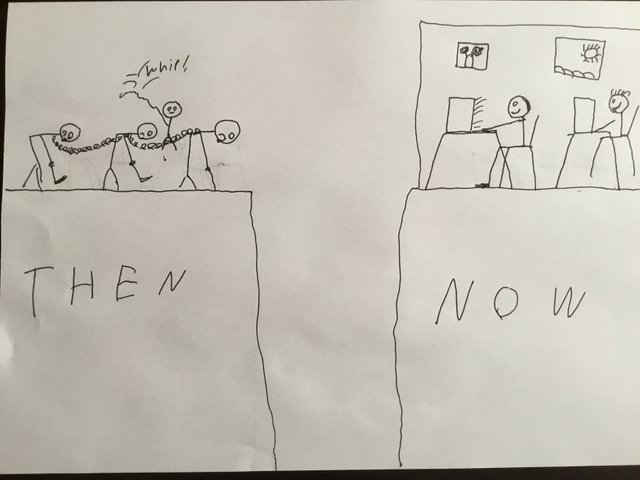On Slavery (part one)
ON SLAVERY (PART ONE)
The past, it has been said, is a foreign country where things are done differently. At times, when looking back at the past, one feels a sense of relief to live now and not then. Who, for example, has heard of accounts of people enduring surgery while awake and aware and not thought “thank goodness I live now, when anaesthesia exists”?
And then there is the practice that is the main topic of this series. Slavery was once legal and widely practiced. Thank goodness we live now, when it is not only illegal but considered so morally repugnant there is a call to take down the monuments of historical figures whose fortunes partially depended on it, regardless of what philanthropic achievements they may also have accomplished. Not everyone believes this move to strip historical figures of their monuments because they did not live according to modern ethical principles is just, but we must all feel that the abolishment of slavery ranks as one of the high points of human progress.
Yet I feel like we have the wrong belief when it comes to slavery. Not wrong in the sense of our moral attitude toward it, but in the sense of how we think it ended and the extent to which it did end.
The way its end is popularised
In the popular imagination, it was the superior moral argument that ended slavery. Abolitionists campaigned to make it illegal and as right was on their side they ultimately won. And that was that, slavery was abolished. And while it was being practiced, we are encouraged to believe it was always the most brutal violation of a person’s liberty. Dramas and documentaries always portray the practice as white Europeans colonising foreign lands and, finding people of colour and being too prejudiced to see we are all the same beneath the superficial difference of skin tones, treat them like beasts of burden. They round them up, clap them in chains, throw them into the cargo hold of a ship and then sell them in markets to brutal masters who force them to toil under the crack of the whip.
What these beliefs do is make it seem like a chasm exists between the past and the present. Over there, beyond that great dividing line, there was slavery. Thank goodness we live over here where there is freedom and career opportunities.

(Image by author)
But, really, this is a flawed belief. The abolishment of slavery was neither as decisive nor as complete as we are lead to believe. There is no gulf between slavery and jobs; rather, they exist on a continuum. And if there is freedom to be found along this path, then we have not yet reached that point.
The transition
You only have to imagine how a sudden transition to illegality for slavery would play out in practice to see how it would have been a gradual evolution toward freedom. Picture the scene. You are a slave and, as such, you own nothing at all, not even your own body. But then slavery is abolished and now, for the first time since your capture, there is something you can call your own. You are the sole owner of your labour power. But you don’t own anything else, and everything around you is the property of others. You cannot farm the land in order to grow your own food because that’s somebody else’s private property. You own no tools and have no money with which to buy them and you cannot just take some for to do so would be stealing.
All in all, as a former slave who now owns your own labour power and little else, your options are going to feel very limited. In fact, you would probably feel like there is only one thing you can do. You are going to have to beg your former masters to employ you. Now, this is hardly going to be a negotiation between equals. Pretty much all the bargaining power will be in the hands of the rich, propertied and well-connected former owners. So, when you come begging for a job, are you really going to be offered reasonable hours, paid vacations, entitlement to in-work safety protocols and a decent salary? No, certainly not, not if your former masters follow capitalist logic and are out to hire labour as cost-effectively as possible. What you will be offered would be work that is barely distinguishable from your former state of complete servitude, with no rights other than the right to quit and wages so low you can only subsist on them (which of course means that actually quitting work altogether feels like an unobtainable fantasy) and (if there are plenty of former slaves also looking for employment) not much chance of getting offers that are better anywhere else. After all, why would former owners not squeeze every last drop of value out of your labour power, when they hold all the bargaining chips?
The comedian Steve Hughes summed up how it really felt the day slavery was ‘abolished’ in one of his stand-up shows:
“Right! You lot are free to go. We’ll see you back here tomorrow at six-thirty!”.
In the next instalment, we will see that the situation was probably even worse, because of how rigged society was against those recently ‘liberated’ slaves.
REFERENCES
“The New Human Rights Movement” by Peter Joseph
Steve Hughes standup routine
i'm interested to see how the illustrations for part 2 look like..
Posted using Partiko Android